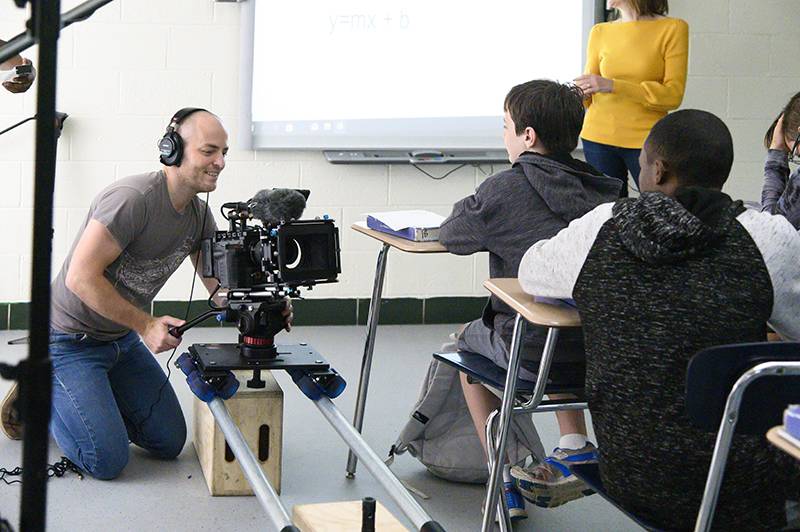The annual Pens to Lens Gala is many things: a film festival, a rare red carpet event, a celebration of our talented youth, and a chance to enjoy film posters by local illustrators and designers. We at Smile Politely have long been fans of this groundbreaking program, and with good reason. For this writer, the Gala is a yearly reminder of how truly remarkable our community can be when we work together.
Take students with ideas for screenplays, give them encouragement from parents, teachers, and friends, then add the temptation of winning a local screenwriting competition run by the Champaign Urbana Film Society. Add to this a crew of local filmmakers who volunteer to work side-by-side with these screenwriters to bring their vision to the big screen. Top it off with a red carpet gala, local paparazzi, and bespoke movie posters made by some of our town’s finest designers and illustrators. Stir it gently, add time, patience, and lots of good will and you’ve created the kind of culture every young creative (and some not so young creatives) wishes they had grown up in, one that stands up for the talents and dreams of its young people.
In a time of division and distraction, the Pens to Lens Gala reminds us of the power of art to bring us together, to educate and inspire, and to create empathy. Pens to Lens is Champaign Urbana at its best. So come be a part of it this Saturday.
Pens to Lens co-organizer Rebecca Nicol recently took time out of her busy pre-Gala schedule to chat with me about the program’s secret to success and what we can expect at this Saturday’s Gala.
Smile Politely: Congratulations on such long-standing success with Pens to Lens. What do you think is its secret to success?
Rebecca Nicol: Thanks! We have had a lot of fun over the years and I think that is a big part of what keeps the program going. It is so fun to see what the students have written each year. I think students and filmmakers keep coming back because there is so much potential to tell a great story. Kids are encouraged to write about whatever is on their minds and directors can choose from many stories from different genres and writing styles.
SP: I’ve always wondered how it came about. What was the inspiration? Similar competition or festivals in other parts of the country? How did Pens to Lens go from a germ of an idea to actual competition and gala.
Nicol: At first we just wanted to figure out how to create opportunities for the local community to learn about filmmaking, and we decided the best way to do that would be to focus on kids. The idea of a screenwriting competition was to create a very low barrier to entry: filmmaking gear can get expensive, but anyone can write a script. It really has been fun to see the program grow and change. We started at the Art Theater the first year and ran out of seats, then we moved to the Virginia. Five years ago we started the student film competition where students write and produce the film themselves and it has been really fun to films written and produced by kids as well.
SP: How many submissions did you have this year?
Nicoi: We had 127 scripts submitted this year.
SP: How do you decide which scripts to produce? What are some of the winning qualities?
Nicol: Directors read the scripts and then pick their favorites to produce. Each director is looking for something different, so it’s a little difficult to nail down winning qualities that would work for everyone. Sometimes a director goes in looking for something easy to make and simple with one or two locations and doesn’t need a lot of specific props and or a director can go in looking to do an animation so they want something a little more complicated and larger than life. Or sometimes a director will look for a comedy, but then they find a drama that really speaks to them and they go off in an entirely different direction.
SP: Simultaneous to the screenplay completion, Pens to Lens also holds a short-film production competition. How do these films get made? What level of participation do the students have on their own short films?
Nicol: In the rules of Student Film Competition students, especially younger ones, can have assistance from adults, but they have to write and direct their films on their own. Some students get a team together and check out the student filmmaking kit from the CU Film Society, some use their own equipment, and some have been shot on cell phones. The fun thing about the student competition is that the films are solely produced by students so they have control over every aspect of their film.
SP: Do you ever see any similarities in topics/genre among certain age groups?
Nicol: We get such a variety each year it can be hard to say. I have noticed that older kids tend to write more about relationships and younger kids write more fantasy and cartoon oriented stories, but we have had surprises from each age group. Some years we get kids from different age groups interested in the same topic that we aren’t sure exactly where it comes from. One year we had a lot of scripts about Alzhiemers and we weren’t sure what sparked those inspirations that year.
SP: Were there any trends in this year’s submissions?
Nicol: If anything, there were fewer scripts in some categories that have been very popular in past years, such as those focusing on social justice topics, or serious personal drama.
SP: What would people be most surprised to learn about the Pens to Lens process, from idea to production to gala? Is there anything new this year?
Nicol: After doing it for seven years, it’s hard to guess what others might find surprising! One thing we do make a point of behind the scenes is ensuring that when the filmmakers read the screenplay entries, they have no way of knowing who wrote them before making their selections. We want to sidestep any potential bias as much as possible and ensure that selections are made based on the strength of the writing.
 SP: What have been some of the best surprises over the years?
SP: What have been some of the best surprises over the years?
Nicol: It has been really great to see the kids who have been involved year after year growing and developing as artists. Their passion and creativity is incredibly inspiring, and we can’t wait to see where they go from here.
SP: What are the biggest challenges you and other Pens to Lens organizers and volunteers face?
Nicol: The organizing team is very small for this program, so getting things coordinated can be a difficult. Also, we are able to reimburse our directors for some of their production costs, but we can’t guarantee that we can cover all of the costs associated with their films. Most years there are a few directors that pay for some filming costs out of pocket. Which is a lot to ask of them considering they are already giving a good chunk of their summer to produce these films. I think it really speaks to our wonderful film community that they are willing to make those sacrifices for the program.
SP: What have been the biggest rewards for you? The biggest successes?
Every year it’s incredibly rewarding to see the community come together to celebrate the creativity of these kids. The audience at the Gala is always incredibly engaged, and it’s electrifying to sit out in that crowd, feeling everyone’s excitement seeing these kids’ stories coming to life.
SP: What can our readers expect at this year’s Gala?
Nicol: This year we will have one screening that will begin at 3:00 p.m. on Saturday, August 10th. We encourage everyone to show up early to get their tickets and have their picture taken on the red carpet. No one wants to be stuck in the ticket line right before the show begins!
SP: What can you tell me about some of the Pens to Lens alumni? Have any gone on to make additional films or pursue a career in the film industry?
Nicol: One of the things we’ve really loved seeing as the program has continued is students who started out writing screenplays for the competition coming back after graduation to help produce scripts written by other students. A few of the alumni we’ve kept up with are studying filmmaking, digital media, or acting in college, and we’re very excited for the year we’ll get to screen an entry produced by an alum who’s gone on to become a professional filmmaker.
SP: Pens to Lens brings so much to so many different parts of our community. How can our readers help support your mission?
We are always accepting donations on our website. Any contributions we receive go directly towards producing films. We are also always excited to have volunteers if anyone would be interested in getting involved they can contact us at [email protected]. And most importantly if you would like to support our program, please attend our gala this Saturday, August 10th at 3:00 p.m.
Pens to Lens 2019 Gala
The Viriginai Theatre
203 W Park Ave, Champaign
Saturday, August 10th, 2 to 5 p.m.
Get tickets online
Check out the 2018 films and amazing locally designed film posters here. And if you can’t attend, find out how else you can participate in and support this remarkable program, which, by the way, recently received its official non-profit status).
Top photo from Pens to Lens 2019 Gala Facebook event page, additional behind the scenes photo of Work Hard, Play Hard, directed by John Isberg, taken by Darrell Hoemann.








